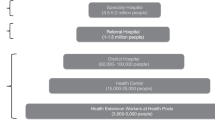Abstract
To understand women’s pre-abortion conversations with members of their social network about their abortion decision. Semi-structured interviews were conducted with women presenting for first-trimester surgical abortion at a high volume, hospital-based abortion clinic. Women were asked their reasons for discussing or not discussing abortion and responses received after disclosing their abortion decision. Interviews were transcribed and computer-assisted content analysis was performed. Salient themes are presented. Thirty women who obtained an abortion were interviewed. All but three spoke to at least one member of their social network about their abortion decision making. However, women were very selective about whom they spoke to regarding this decision. Reasons not to discuss their abortion decision included: concerns about judgment, desiring to maintain privacy, and certainty about their decision. Reasons to discuss their abortion decision included: seeking information about the procedure, needing guidance about their decision, wanting support for their decision to proceed with abortion. While many were concerned about being judged, most women who spoke about their decision experienced a positive response. Though most women in this study had at least one person to turn to for assistance with abortion decision making, many participants avoided confiding in some or all members of their social network about their abortion decision due to concerns of judgment and stigma.
Similar content being viewed by others
References
Finer, L. B., Frohwirth, L. F., Dauphinee, L. A., Singh, S., & Moore, A. M. (2006). Timing of steps and reasons for delays in obtaining abortions in the United States. Contraception, 74(4), 334–344.
Chor, J., Tusken, M., Lyman, P., & Gilliam, M. (2016). Factors shaping women’s pre-abortion communication with their regular gynecologic care providers. Women’s Health Issues, 26(4), 437–441.
Cameron, S. T., & Glasier, A. (2013). Identifying women in need of further discussion about the decision to have an abortion and eventual outcome. Contraception, 88(1), 128–132.
Foster, D. G., Gould, H., Taylor, J., & Weitz, T. A. (2012). Attitudes and decision making among women seeking abortions at One U.S. Clinic. Perspectives on Sexual and Reproductive Health, 44(2), 117–124.
Kapadia, F., Finer, L. B., & Klukas, E. (2011). Associations between perceived partner support and relationship dynamics with timing of pregnancy termination. Women’s Health Issues, 21(3 Suppl), S8–S13.
Jones, R. K., Moore, A. M., & Frohwirth, L. F. (2011). Perceptions of male knowledge and support among U.S. women obtaining abortions. Women’s Health Issues, 21(2), 117–123.
Kumar, A., Hessini, L., & Mitchell, E. M. H. (2009). Conceptualising abortion stigma. Culture Health and Sexuality, 11(6), 625–639.
Sonalkar, S., Gurney, E., McAllister, A., & Schreiber, C. (2017). A randomized pilot evaluation of individual-level abortion stigma resulting from Pennsylvania mandated abortion counseling. Contraception, 96(4), 227–232.
Major, B., Zubek, J. M., Cooper, M. L., Cozzarelli, C., & Richards, C. (1997). Mixed messages: Implications of social conflict and social support within close relationships for adjustment to a stressful life event. Journal of Personality and Social Psychology, 72(6), 1349–1363.
Crabtree, B. F., & Miller, W. L. (1999). Doing qualitative research (2nd ed.). Thousand Oaks: Sage Publications, Inc.
Jones, R. K., & Jerman, J. (2017). Population Group Abortion rates and lifetime incidence of abortion: United States, 2008–2014. The American Journal of Public Health, 107(12), 1904–1909.
Hanschmidt, F., Linde, K., Hilbert, A., Riedel-Heller, S. G., & Kersting, A. (2016). Abortion stigma: A systematic review. Perspectives on Sexual and Reproductive Health, 48(4), 169–177.
Gelman, A., Rosenfeld, E. A., Nikolajski, C., Freedman, L. R., Steinberg, J. R., & Borrero, S. (2017). Abortion stigma among low-income women obtaining abortions in Western Pennsylvania: A qualitative assessment. Perspectives on Sexual and Reproductive Health, 49(1), 29–36.
Jerman, J., Jones, R. K., & Onda, T. (2016). Characteristics of US abortion patients in 2014 and changes since 2008. The Guttmacher Institute. https://www.guttmacher.org/report/characteristics- us-abortion-patients-2014.
Norris, A., Bessett, D., Steinberg, J., Kavanaugh, M., De Zordo, S., & Becker, D. (2011). Abortion stigma: A reconceptualization of constituents, causes, and consequences. Women’s Health Issues, 21(3 Suppl), S49–S54.
Kimport, K., Perrucci, A., & Weitz, T. A. (2012). Addressing the silence in the noise: How abortion support talklines meet some women’s needs for non-political discussion of their experiences. Women and Health, 52(1), 88–100.
Cockrill, K., & Biggs, A. (2018). Can stories reduce abortion stigma? Findings from a longitudinal cohort study. Culture, Health & Sexuality, 20(3), 335–350.
Upadhyay, U. D., Cockrill, K., & Freedman, L. (2010). Informing abortion counseling: An examination of evidence-based practices in emotional care for other stigmatized and sensitive health issues. Patient Education and Counseling, 81(3), 415–421.
Gould, H., Perrucci, A., Barar, R., Sinkford, D., & Foster, D. G. (2012). Patient education and emotional support practices in abortion care facilities in the United States. Women’s Health Issues, 22(4), e359–e364.
Chor, J., Lyman, P., Tusken, M., Patel, A., & Gilliam, M. (2016). Women’s experiences with doula support during first-trimester surgical abortion: A qualitative study. Contraception, 93(3), 244–248.
Funding
Research reported in this publication was supported by the National Center For Advancing Translational Sciences of the National Institutes of Health under Award Number KL2TR000431. The content is solely the responsibility of the authors and does not necessarily represent the official views of the National Institutes of Health.
Author information
Authors and Affiliations
Corresponding author
Ethics declarations
Conflict of interest
The authors report no conflicts of interest.
Rights and permissions
About this article
Cite this article
Chor, J., Tusken, M., Young, D. et al. Factors Shaping Women’s Pre-abortion Communication with Members of Their Social Network. J Community Health 44, 265–271 (2019). https://doi.org/10.1007/s10900-018-0582-1
Published:
Issue Date:
DOI: https://doi.org/10.1007/s10900-018-0582-1




